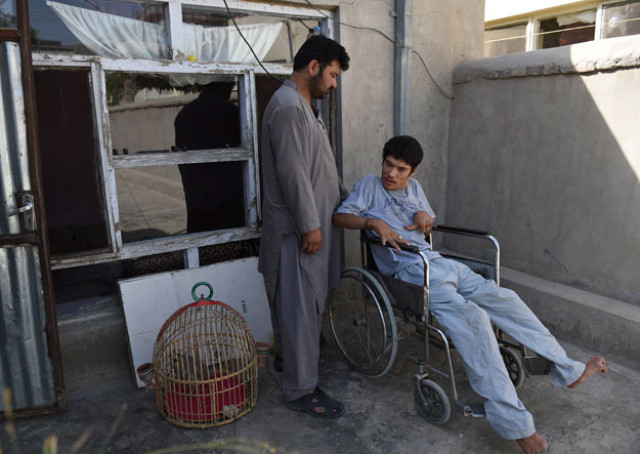Exodus grows as Afghans escape quagmire of violence
Afghans are migrating as pessimism abounds about the deteriorating war

Ashraf and his handicapped, wheelchair-bound brother, are trying to seek asylum in another country. PHOTO: AFP
The toppling of the repressive Taliban regime in 2001 had ignited new hope about the future of Afghanistan, bringing waves of Afghan refugees home, but recent years have witnessed a stark reversal of that trend.
The snaking queues outside Kabul's passport office are a totemic indicator that the exodus is gathering fresh momentum as pessimism abounds about the deteriorating war, the tanking economy and a government widely derided as lacking direction.
Read: Escalating insurgency: Taliban bombing kills 21 in Afghanistan
Ashraf, 28, casts worried looks around him as he bolts the door of his spartan home in a crowded Kabul suburb and gets the people-smuggler named Murad, "highly recommended" by a friend, on the phone.
"Meet me in Nimroz (on the Iran border)," Murad says over the crackling line after a lengthy exchange of greetings. "The journey to Tehran will take four or five days -- partly by car, partly on foot."
"I have a handicapped, wheelchair-bound brother," says Ashraf, who allowed AFP to listen to the conversation but requested that his last name be withheld.
 Ashraf and his handicapped brother. PHOTO: AFP
Ashraf and his handicapped brother. PHOTO: AFP"For you it'll cost 2.2 million Toman (US$700); for your brother three million -- because he cannot walk," Murad says.
"What if we are arrested and deported?" Ashraf asks, his tone cagey.
"No, no," retorts Murad.
"I've been deported before and got duped (by the smuggler)," Ashraf insists.
"Listen brother, I give you 100 percent guarantee."
Ashraf, an oil-tanker driver who carries supplies from Kabul to military bases in Taliban-prone provinces, was deported -- first from Indonesia, next from Malaysia -- while attempting to reach Australia in 2012.
Hopeless and broke, his third attempt to flee spotlights the anguished personal choices of Afghan civilians, increasingly caught in the cross-hairs of an ascendant 14-year insurgency.
The number of Afghans seeking asylum in industrialised nations has surpassed all previous years since 2001, with the UN refugee agency reporting a 65 percent surge in applications in 2014 over the previous year.
- 'Everyone is leaving' -
"Almost everyone I know is leaving or planning to leave -- my aunts, my cousins, my neighbour, my friend in Kandahar," said Azeem Raheemi, 48, a transporter for a poultry feed supplier.
Raheemi, a father of three, lives near Shah Shaheed, a working-class Kabul neighbourhood which was hit in a recent wave of fatal bombings.
The truck bombing which engulfed the area in flames was strong enough to tear a massive hole in the ground, evoking comparisons to a meteor strike.
As Raheemi cowered inside his home with his family, his resolve to leave strengthened.
"A bomb could explode any minute, anywhere. You could be sitting on the curb in a street and wind up dead," he said.
After cold-calling Western embassies did not bear fruit, he is attempting to get a visa for neighbouring Iran.
Read: Afghan Taliban denies involvement in Kabul truck bombing
Four decades of war has brought endurance, but the expanding conflict, the spectre of the Islamic State along with rampant joblessness and economic distress have whipped up an undercurrent of fear and hopelessness.
The fractious power-sharing government headed by President Ashraf Ghani and Chief Executive Abdullah Abdullah -- seen as a "car with two drivers" working sometimes at cross-purposes -- is blamed for failing to halt militant attacks.
- 'Cops and bombers' -
The desire to leave cuts across economic classes.
One middle-class family told AFP the decision to relocate to Turkey was affirmed when their friendly neighbourhood game of "cops and robbers" morphed one day into "cops and bombers" -- with their son playing the suicide attacker to mock screams and giggles.
For another, it was the growing weariness of navigating labyrinthine back routes to avoid possible bombing targets in Kabul -- a war-scarred city awash with checkpoints, snipers and surveillance blimps.
"There is a widespread feeling that things aren't getting any better," said Khushal Nabizada, a 34-year-old doctor of internal medicine.
"Constantly lamenting the dead and girding for the worst takes a huge psychological toll."
Nabizada cites the case of his patient who suffered shrapnel wounds in a suicide attack in Kabul in 2012.
"He called long after his scars healed to complain about regular bouts of headaches, diarrhoea and sleeplessness."
Those ailments dissipated this month when the US embassy in Kabul approved Special Immigrant Visas for his family.
"What really ailed him is the war," said Nabizada.



















COMMENTS
Comments are moderated and generally will be posted if they are on-topic and not abusive.
For more information, please see our Comments FAQ